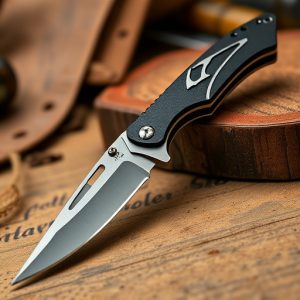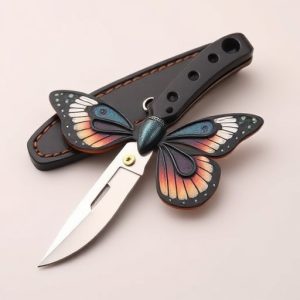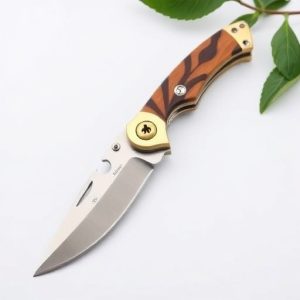Navigating Butterfly Knife Legality: A Guide to State and Federal Laws on High-Quality Collectibles
High-quality butterfly knives are subject to a nuanced legal framework that varies across states and…….
High-quality butterfly knives are subject to a nuanced legal framework that varies across states and local jurisdictions in the United States. While at the federal level, these knives may be considered ceremonial or decorative under certain conditions, state laws offer a wide spectrum of regulations ranging from allowing for collector possession to prohibiting them outright, especially those with one-handed opening mechanisms due to safety concerns. It's essential for individuals to research and stay informed about the specific laws in their area, as legal compliance is critical to avoid severe penalties. Owners must navigate this dynamic legal landscape, which requires understanding both federal statutes and local ordinances. Regular updates on knife legislation are necessary due to its tendency to change, making it crucial for collectors of high-quality butterfly knives to engage with law enforcement or legal experts to ensure their collections remain compliant. In summary, responsible ownership and display of high-quality butterfly knives necessitate a thorough grasp of the complex legal status they hold in various jurisdictions within the United States.
Butterfly knives, a versatile and high-quality tool for collectors and professionals alike, navigate the intricate legal framework that governs their possession and use. This article dissects the varying state statutes and federal regulations to demystify the legal landscape surrounding these intricate blades. From understanding the nuances of butterfly knife laws across different states to ensuring compliance with both federal and local ordinances, this guide is an indispensable resource for anyone seeking clarity in the realm of high-quality butterfly knife ownership.
Understanding the Legal Landscape of High-Quality Butterfly Knives
navigating the legal landscape of high-quality butterfly knives requires a nuanced understanding of state and local regulations. These intricate folding knives, often appreciated for their craftsmanship and functionality, are subject to varying laws that govern their possession, carrying, and use. Owners of high-quality butterfly knives must be cognizant of the specific statutes in each jurisdiction they inhabit or travel through. Legal classifications may categorize these knives under different types of weapons, influencing permissible uses and restrictions. For instance, some states may consider them as collective entities alongside other utility blades, while others might impose more stringent controls due to their tactical features. It is imperative for enthusiasts and owners to research and stay informed about these laws, as penalties for non-compliance can range from fines to criminal charges. Consequently, the responsible ownership of high-quality butterfly knives necessitates a clear grasp of the legal framework within which one operates.
The Variety of Butterfly Knife Laws Across Different States
The legal landscape governing high-quality butterfly knives varies significantly across different states within the United States. At the federal level, a butterfly knife is categorized as a “bona fide” ceremonial or decorative item when it meets certain criteria. However, the individual states hold primary jurisdiction over their citizens’ possession and use of such knives. In some states, possessing a high-quality butterfly knife is perfectly legal for collectors and enthusiasts, while in others, these knives are strictly regulated and may only be owned by individuals who can demonstrate a legitimate need, such as performers or workers in specific industries. State laws often differentiate between the types of butterfly knives, with some prohibiting those that can be opened with one hand, due to concerns over their potential use in crimes. These distinctions underscore the importance for individuals to familiarize themselves with the specific regulations of the state they reside in or intend to visit, as penalties for unlawful possession can range from fines to imprisonment. It’s crucial for collectors and users of high-quality butterfly knives to stay informed about these laws, which are subject to change, ensuring compliance with both the letter and spirit of the law.
Ensuring Compliance with Federal and Local Regulations for Your High-Quality Butterfly Knife Collection
When curating a collection of high-quality butterfly knives, it is imperative to stay abreast of both federal and local regulations that govern their possession and use. These regulations can vary significantly from one jurisdiction to another, with some areas imposing strict limitations on the types of folding knives, including butterfly knives, that can be legally owned. To ensure compliance, collectors must first familiarize themselves with the overarching federal statutes that define the legal boundaries of knife ownership. These statutes set forth criteria for what constitutes a prohibited knife and include specific definitions and exceptions for certain types of folding knives.
Once the federal framework is understood, it is equally crucial to delve into the local ordinances that may have more stringent or different regulations than those at the national level. Local laws can be influenced by regional concerns, cultural factors, and historical precedents, leading to a diverse tapestry of knife laws across the country. High-quality butterfly knives, prized for their craftsmanship and functionality, must adhere to these local regulations to avoid any legal complications. Collectors should routinely consult with local law enforcement or legal experts to confirm that their collection aligns with the current laws, as legislation can change over time. By doing so, enthusiasts of high-quality butterfly knives can responsibly enjoy and showcase their collections while remaining compliant with all applicable laws.


